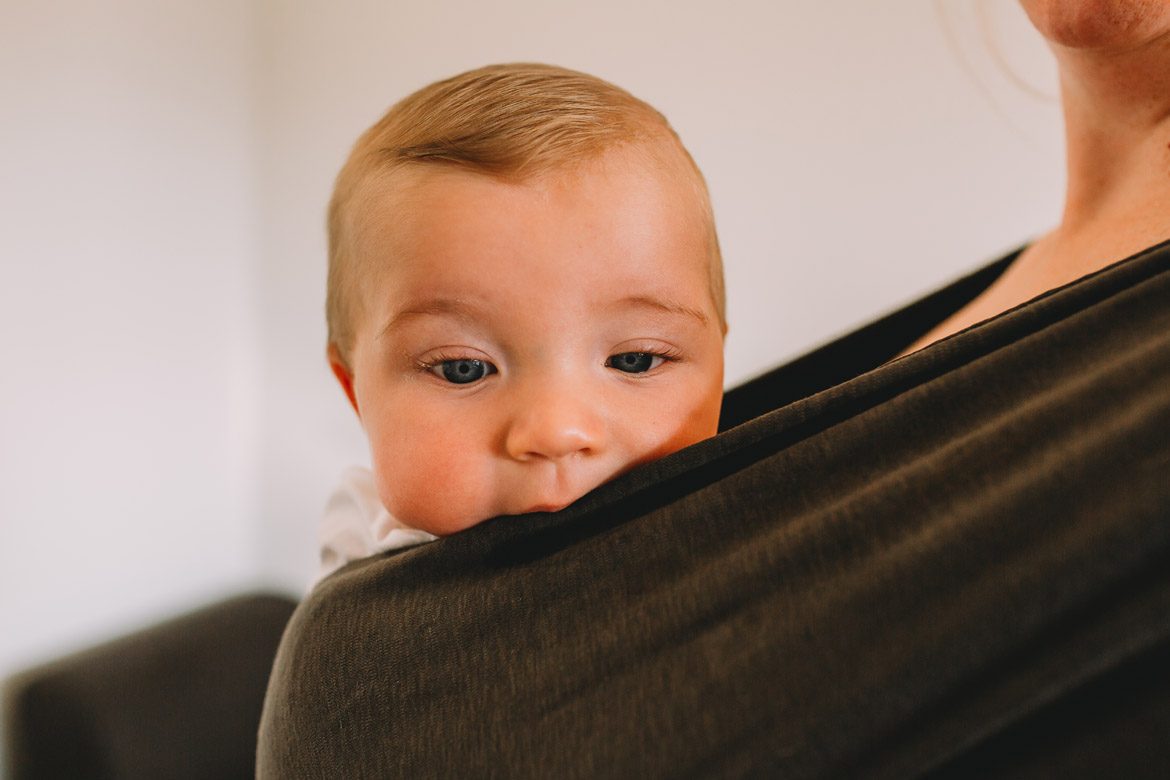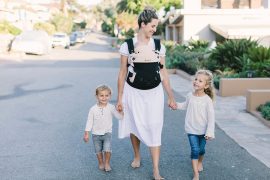By Dr Rosie Knowles. This is the third part in the Carrying Matters series of articles. Read Part 1 and Part 2.
The positive effects of carrying for society are many; making a change at an individual level can have a significant impact when lots of people do it! In-arms carrying and using slings is one way that we can change the future that we all have to live in.
Possibly one of the most important positive outcomes for carrying for a parent and the society we live in is the effect it can have on mental health, which is a society-wide issue.
Western society is increasingly fractured and isolated, with a decreased sense of local community and shared care. The burden of mental unwellness in our society is growing, and becoming a parent with this background can be very tough indeed.
The birth of a baby is often an overwhelming time for both parents, especially when also faced with the expectations and demands of a fast-paced culture that often judges people by their apparent productivity and appearance. It is no wonder that postnatal depression is on the rise – affecting at least 10-15% of new mothers. This is likely an underestimate as parents feel ashamed to admit their feelings, with the effects of hiding their struggle having significant knock-ons for the whole family.
Fathers are often unrecognised to have the condition themselves, and this all adds to an increased risk of children coming to harm. This is a terrible indictment on our culture and its lack of care for some of the most vulnerable individuals in our communities.
The way we live now isn’t going to change overnight; funding for parental leave or greater support for mental health isn’t going to become suddenly available, and the media bombardment of products for parenting won’t vanish. But neither are the emotional needs of young children going to go away, especially if we want them to grow up well and be happy, confident mature individuals who are well integrated into society.
We need to find ways to nurture our children while still functioning as our culture expects us to, and this is where carrying children (often using a sling) can help. Carrying children encourages and protecting parent’s precious closeness with small children while helping to build the bonds that will be the foundations for a positive future. Giving children a secure and confident start in life pays dividends later for the whole of society.
- Families who enjoy secure attachments and strong bonds are more likely to weather the early years of parenting safely and build resilient children with a secure self-esteem. This will help to counteract the growing burden of mental “un-health” especially as funding for mental health services continues to decrease. Carrying (and using slings), via oxytocin release, helps to build these bonds; and can improve resilience to the Adverse Childhood Experiences that so many children experience. Read more about ACE’s here.
- Anything that improves mental health and assists families struggling with PND is worth investing in, especially something as accessible and low cost as a carrier.
- A very sobering review of international attachment studies done by the Sutton Trust found that infants under three years who do not form strong bonds with a parent “are more likely to suffer from aggression, defiance and hyperactivity when they get older.” They found that up to 40% of children lack this secure bond with their parents, and this is likely to lead to their own children also suffering from insecure attachment; a vicious, repeating cycle. “Parents who are insecurely attached themselves, are living in poverty or with poor mental health find it hardest to provide sensitive parenting and bond with their babies.”
See next page for more…











